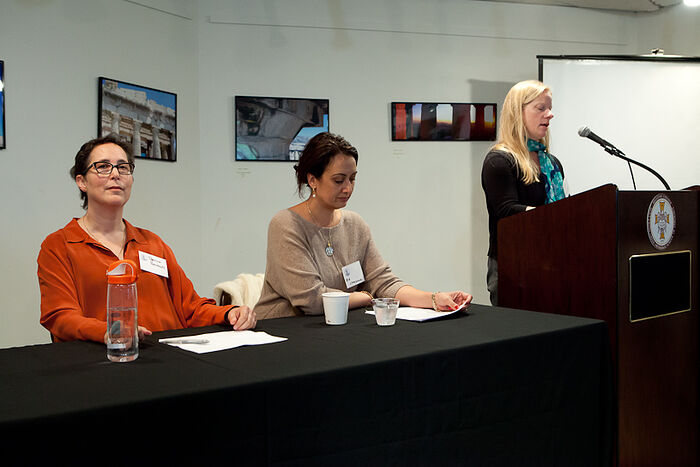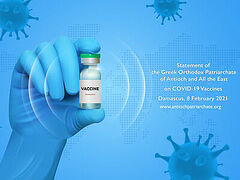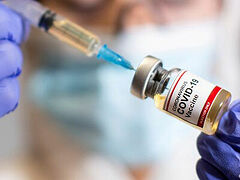U.S.A., March 25, 2021
The Orthodox Theological Society in America has issued a document, “Covid-19 vaccines: How they are made and how they work to prime the immune system to fight SARS-CoV2,” addressing a number of frequently asked questions concerning the safety and ethics of the coronavirus vaccines that have been or are being developed.
According to the Society’s website, “The purpose of the Orthodox Theological Society in America is to promote and coordinate the work of Orthodox theology, cultivate fellowship among Orthodox theologians and those engaged in related disciplines, serve as a resource for the Assembly of Canonical Orthodox Bishops of the United States, and engage non-Orthodox theologians interested in Orthodox theology.”
The Society includes such well-known figures as Fr. John Jillions, Dr. Peter Bouteneff, Dr. Aristotle Papnikolaou, Gregory Tucker, Dr. Brandon Gallaher, Dr. Paul Ladouceur, Dr. David Bradshaw, Dr. Gayle E. Woloschak, and many others.
The document, prepared by Society members, addresses questions such as, “Which vaccine should I get?”, “Have the mRNA vaccines relied on fetal cells at any point?”, “Are the vaccines unethical because of the use of aborted fetal cells?”, “Is it possible to insert a microchip into the Covid-19 vaccine?”, “Do I still need to wear a mask after I receive the Covid-19 vaccine?”, “Will the vaccine change my DNA?” and many more.
The document begins urging people to receive the vaccine they are offered:
The goal of all vaccines is the same: to activate the immune system to be prepared to fight against the actual infectious agent (e.g. a virus) should the individual become infected. If we take the approach to never miss an opportunity to vaccinate, we will more easily end this pandemic. Because vaccines are a safe way to prevent viral infections, including Covid-19, physicians and scientists generally recommend that individuals take the authorized vaccine that s/he is being offered. In special circumstances such as pregnancy or immunocompromised individuals, a doctor should be consulted.
Regarding the use of fetal cells, the document notes that the Pfizer and Moderna mRNA vaccines and others were not made from fetal cells that came from an abortion, but “were tested in culture against fetal cells to help ensure that they would not harm a fetus as well as to ensure that the technology works in a human cell.” The Society emphasizes that the cells trace to abortions from the 1960s and 70s and that “no new fetuses have been sacrificed since that time for any vaccine tests.”
Meanwhile, many non-mRNA vaccines are “grown using the same fetal cell line,” the document notes, as were the Rubella and chicken-pox vaccines used in the United States.
While many are concerned about the ethics of using such vaccines, the Society writes that, “Several significant factors lead to the conclusion that the vaccines present the best ethical option to promote health and life, despite their connection with the use of aborted fetal cells.” The cells are from abortions decades ago, that were not performed for the sake of developing vaccines; many vaccines in use in the U.S. and worldwide are made from these cells, as other cell lines have proven ineffective for growing vaccines; and “Most Church leaders have agreed that the many lives saved by vaccination are an important factor in permitting the use of these vaccines,” the Society writes.
For more information on the morality of the cell lines, the document points to a recent summit held by the Patriarchate of Constantinople, a statement from the Vatican, and a statement from the United States Conference of Catholic Bishops.
According to the document, a mask must still be worn even after a person has received a vaccine: “Yes. The reason for this is because the endpoint or goal of the Covid-19 vaccine clinical trials were to prevent severe Covid-19. Therefore, we do not yet know whether the vaccine will prevent transmission of virus. However, we will find out soon.”
Microchips cannot be inserted into the vaccines, the vaccines cannot alter DNA, and the vaccines are safe despite how quickly they were developed, the Society writes in response to these popular questions.
The document also addresses many other issues about how vaccines work, their efficacy, and for whom they are safe to take.
Follow us on Facebook, Twitter, Vkontakte, Telegram, WhatsApp, Parler, MeWe, and Gab!







